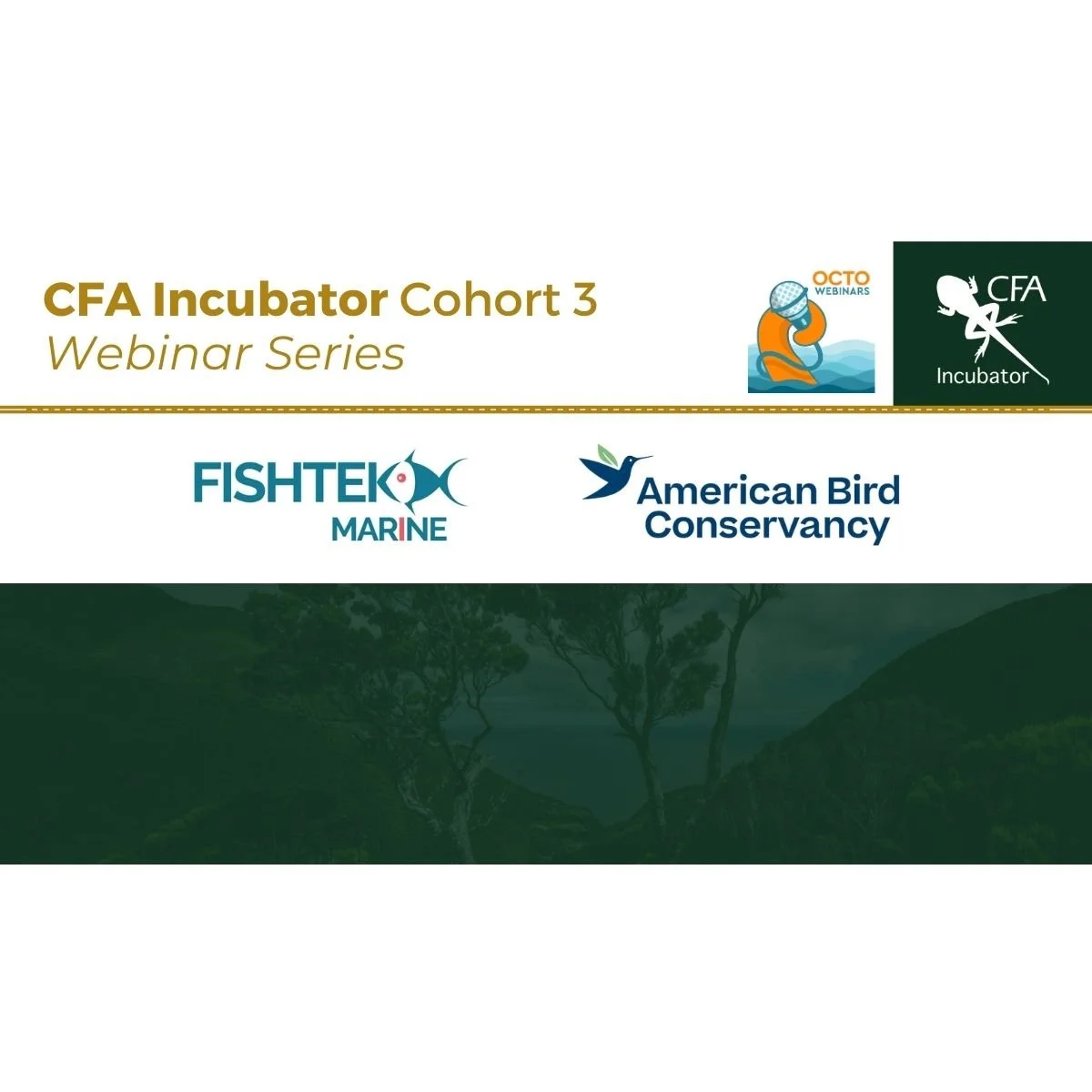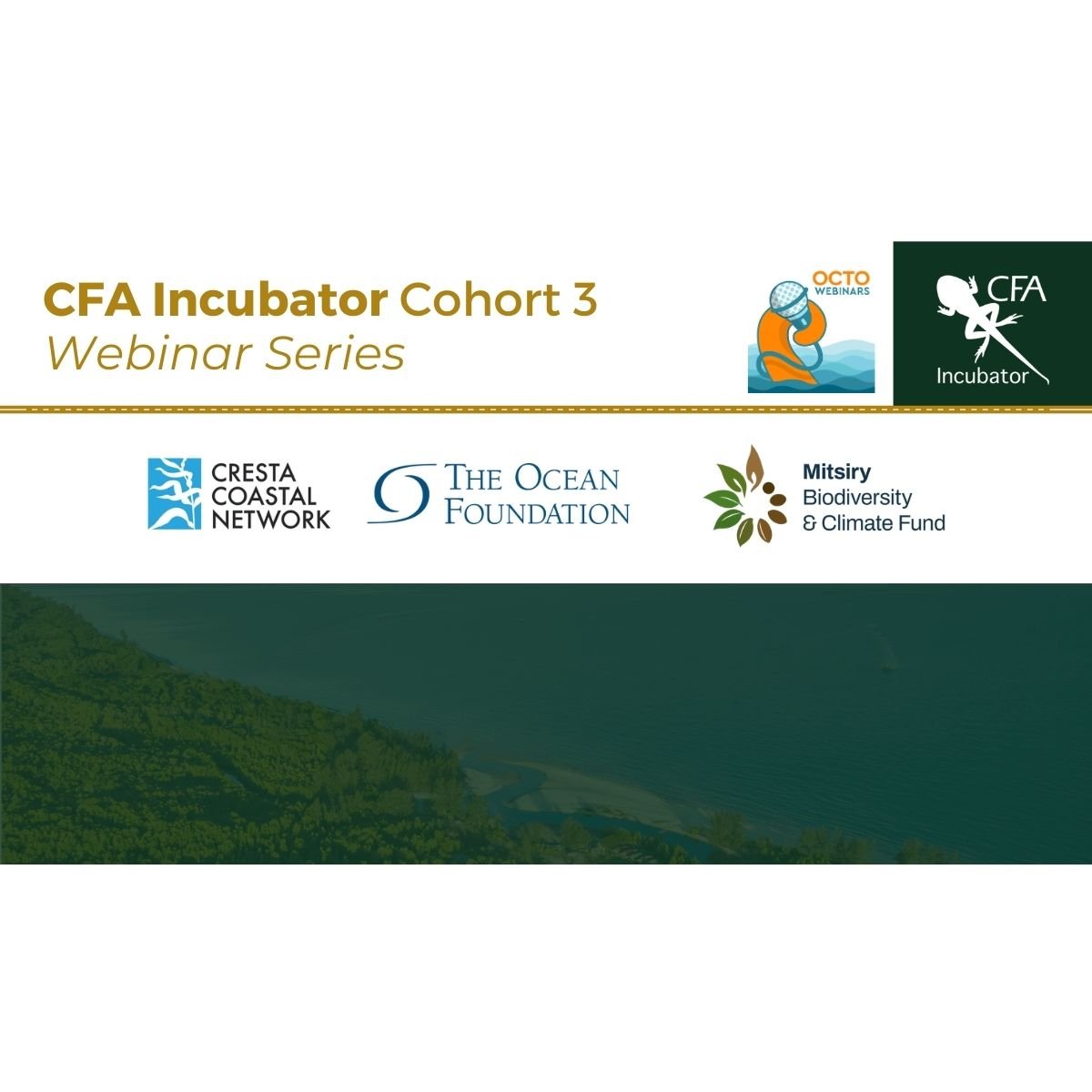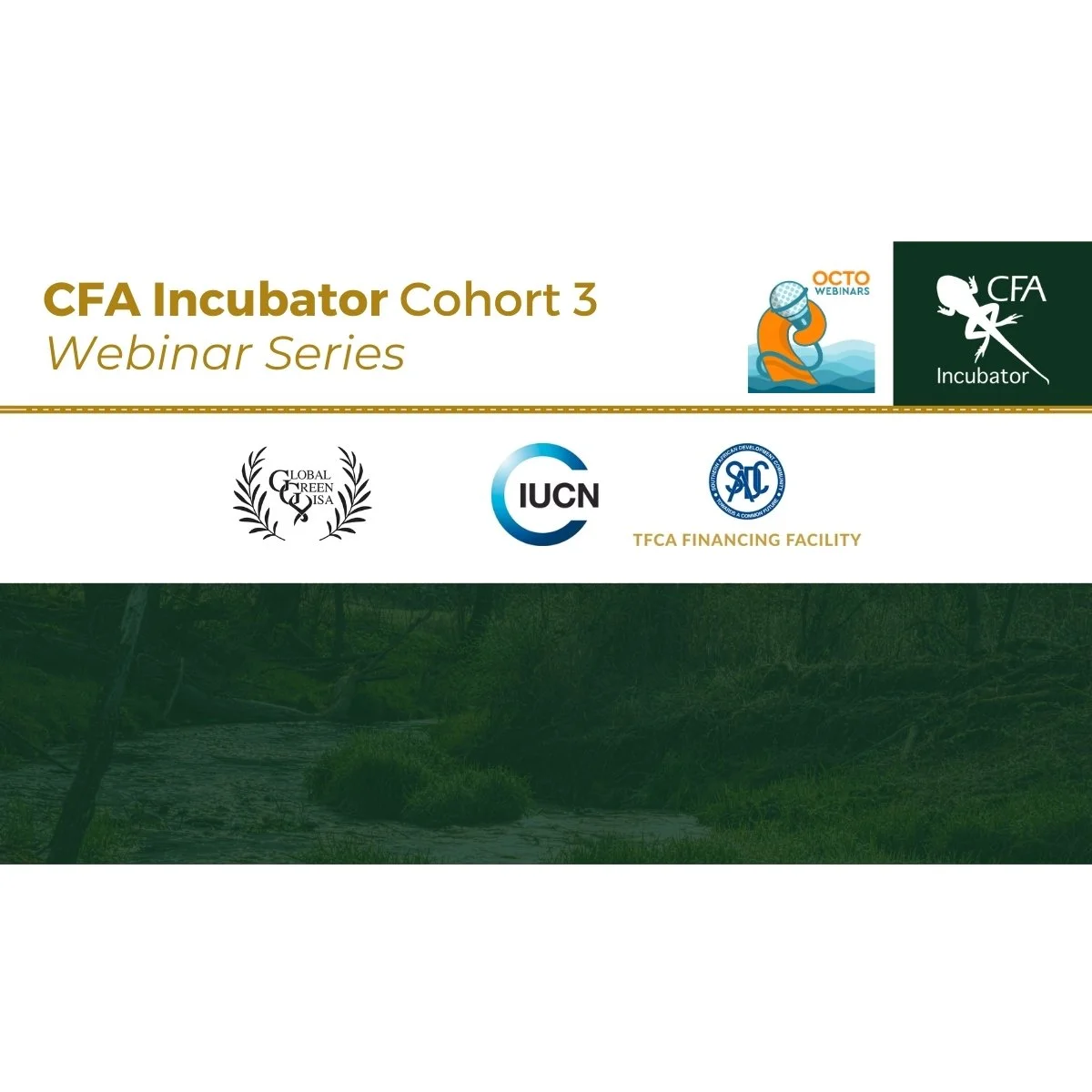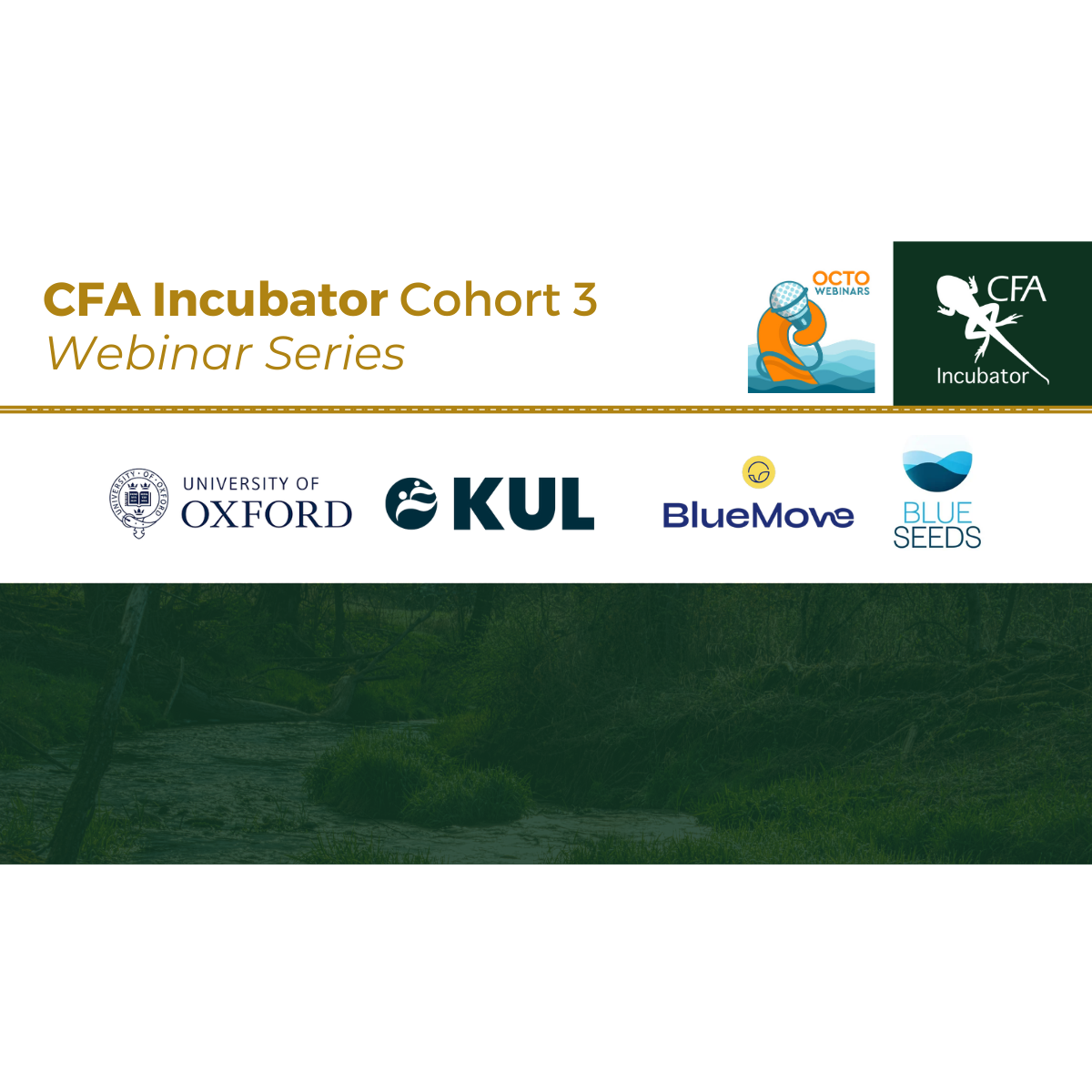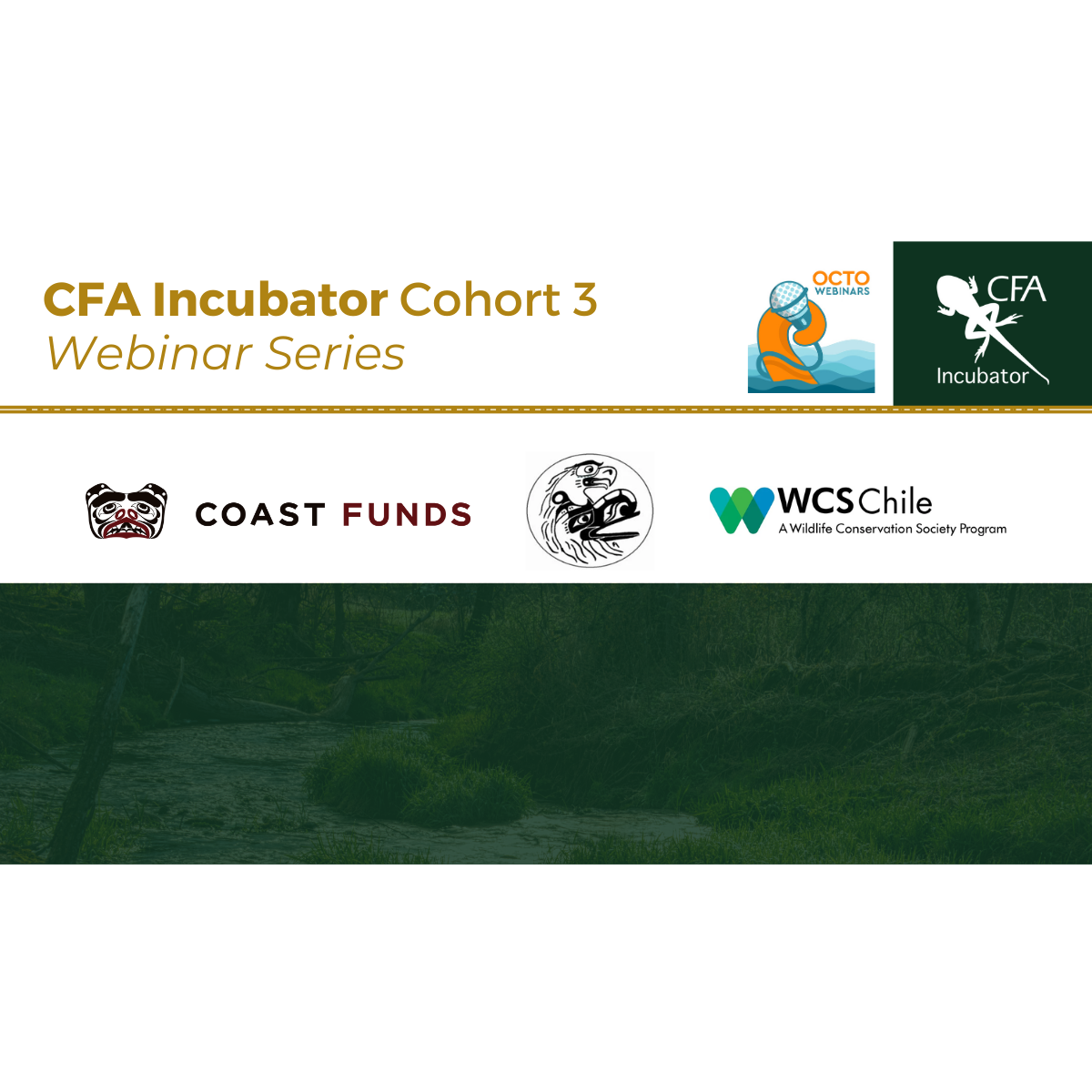This webinar will highlight two conservation enterprises: one focused on enabling sustainable fisheries and the other on biodiversity measurement – both cases exploring how robust data, technology, and impact metrics can help make conservation enterprises investable, improve accountability, and mobilize capital for nature-positive outcomes.
CFA Incubator Showcase #4
CFA Incubator Showcase #3
CFA Incubator Showcase #2
CFA Incubator Showcase #1
Practice guidance for protected and conserved area finance
Conservation Finance Alliance, IUCN World Commission on Protected Areas (WCPA), and the Sustainable Finance Specialist Group hosted a special webinar to launch the new Practice Guidance for Protected and Conserved Area Finance. This resource provides practical tools, case studies, and insights to help conservation professionals develop sustainable finance strategies across public, private, Indigenous, and philanthropic sectors.
The event featured the authors of the guide, who presented key content—including 16 factsheets on major conservation finance mechanisms—and discussed how well-designed financial planning can lead to more durable, equitable, and effective outcomes for protected and conserved areas.
Speakers
David Meyers, Executive Director, Conservation Finance Alliance
Kathleen Fitzgerald, The Pew Charitable Trusts
Madhu Rao, Chair WCPA
Jessica Smith, UNEP Finance Initiative
Ross Dixon, Coast Funds
Hugo Van Zyl, Conservation Finance and Economics Expert
Lucy Emerton, Conservation Finance and Economics Expert
Thierry Lefebvre, Acting Head Protected and Conserved Areas Team, IUCN
Leveraging Economics & Finance for Nature
This webinar offered valuable insights into the critical role of economics in conservation and the innovative financial tools shaping the future of sustainable land and water management. The event brought together experts from Conservation Strategy Fund and the Conservation Finance Alliance—now working in collaboration—to share practical strategies for addressing climate change and biodiversity loss through effective conservation finance. Together, they highlighted how economics, finance, and conservation can work hand in hand to protect our planet.
Speakers
Pedro Gasparinetti, CSF
Stefanie Rakela, CSF
David Meyers, CFA
Moderator
Scott Edwards, CSF
REEF+ Webinar - Marine Biodiversity Credits: Emerging Opportunities and Challenges
Just as carbon credits help fund carbon reduction initiatives, biodiversity credits are increasingly being piloted as a market-based solution to drive finance towards biodiversity conservation. The discussions addressed the potential benefits of marine biodiversity credits.
David Meyers, Executive Director, Conservation Finance Alliance, and Senior Technical Advisor, is part of that discussion.
Biodiversity Credits, Current Challenges & Opportunities
This webinar explored the most recent challenges and opportunities of Biodiversity Credits as an innovative tool for financing nature. Each panelist shared their latest updates on the application of biodiversity credits and any advice they have for conservationists.
Speakers
Sinclar Vincent, Verra
Toral Shah, Plan Vivo Foundation
Timothy Male, Environmental Policy Innovation Center
Grégoire De Warren, International Advisory Panel on Biodiversity Credits
Moderator
David Meyers, Executive Director, Conservation Finance Alliance
The Business Case for HIFOR with WCS
This webinar introduced and explored the High Integrity Forest (HIFOR) Investment Initiative which aims to create a new climate and biodiversity asset class to help finance the protection of high integrity tropical forests — those that are least degraded by human impacts — on the basis of their role in climate change mitigation and biodiversity conservation. Can this new tradable asset incentivize the conservation of our last remaining high integrity forests?
Speakers
Daniel Zarin Head of Forests and Climate Change Program at WCS
Ashley Camhi, Director of Innovative Finance, Forests and Climate at the Wildlife Conservation Society, WCS
Charlotte Streck, Co-founder, Climate Focus
Moderator
David Meyers, Executive Director, Conservation Finance Alliance
CFA Incubator Webinar: Nature Stewardship Bonds
The financial sustainability of modern African conservation landscapes is often built around portfolios of nature-based businesses – particularly in the tourism sector; and while these can comprise both successful and responsible businesses, they are all too often characterized by one major shortcoming – their ownership structure does not meaningfully engage or benefit local stakeholders. The conservation community has historically attempted to address this ownership divide by building new community-owned enterprises that lack competitiveness, have long pathways to profitability, and high risks. Mwenzi Capital seeks to democratize existing conservation-focused enterprise ownership and value streams in critical African conservation landscapes. This will be done through making specially structured investments in existing, and hence de-risked, revenue generating nature-based businesses that could benefit from stronger community collaboration – and directing ownership or revenue back to collaborating communities and conservation organizations so that all parties benefit from the enterprise’s enhanced success. The approach is both scalable and flexible and, in tourism markets at least, has current relevance and applicability in the post-Covid-19 period. Initial pipeline development revealed has significant appetite.
CFA Incubator Webinar: Ngwala Inventions
Ngwala Inventions is one among seven finalist of the second cohort selected by Conservation Finance Alliance Incubator’s Technic al Review Committee to receive nine months incubation. Since February 2022, Ngwala Inventions has been receiving mentorship and financial support from Conservation Finance Alliance (CFA) Incubator / Wildlife Conservation Society and its partners. Ngwala In ventions is a registered company in Tanzania with the purpose of solving inaccessibility and unaffordability of organic farm inputs. More – over solving chemical exposure problems caused by farm empty pesticide and fertilizer containers replacing them with A utomated Solar Powered Bio - pesticides and Bio - fertilizer Delivery Machines that allows smallholder farmers to access organic farm inputs on time, on farm ,on credit, at lowest cost and on demand. Since the starting of the incubation in February Ngwala Inve ntions has manufactured 5 Automated Bio - pesticides and Bio - fertilizer machines which are installed at 5 strategic farming locations and currently manufacturing bio - pesticides and bio - fertilizer for refilling the machines. Ngwala Inventions has helped thous and farmers in rural communities with the expectation to reach 5000 farmers by the end of 2022.
CFA Incubator Webinar: Blue Recovery Bond
This work provides a robust first pass at understanding how to evaluate fisheries blue recovery bond candidacy and highlights the types of data / information streams that will prove useful in moving blue recovery bonds for fisheries recovery forward. Using the calculator that we developed to evaluate blue recovery bond candidacy can help any fishery evaluate whether this type of instrument would efficiently contribute to support their sustainability – and also signal interest from fishery stakeholders for this type of instrument.
CFA Incubator Webinar: Ocean Eye
Global studies have shown that stakeholder buy-in is the number one success factor in marine conservation, but too often coastal communities lack incentives to support conservation initiatives. Ocean Eye is a fintech solution for the tourism sector that facilitates micro payments by marine tourists towards coastal communities based on wildlife sightings. In other words, Ocean Eye is a data collection and financial transfer platform that collects wildlife sighting data and transfers ecosystem service payments. The animal sighting reports are directly linked to small payments from tourists that go to coastal communities and incentivize the protection of endangered and vulnerable species. The mechanism creates incentives for communities to reduce harm to nature and become conservation allies.
Practice Standards for Conservation Trust Funds - Using the Standards: Starting a CTF
Please join us on Tuesday, 16 November at 11 am EST for the "Using the Standards - Starting a CTF," the 11th webinar in our series on the Practice Standards for Conservation Trust Funds.
The webinar will focus on how the Standards can be useful in the initial stages of creating a Conservation Trust Fund.
Scott Lampman from USAID-TFCA will provide a context-setting overview, and Sasha Middleton, CEO of the MEPA Trust, and Mirjam de Koning, Executive Director of PONT, will present case studies of their practical experiences using the Standards.
Risk Financing for Nature-Based Solutions
Risk Financing for Nature-Based Solutions
Nature plays a significant role in reducing risks for coastal communities, flooding, food security, and a range of other ecosystem services that often remain undervalued and inadequately financed in our market economy. This inspiring webinar will look at innovative ways in which the risk abatement value of nature can be monetized and maintained through innovative risk financing mechanisms that support ecosystem resilience. Presenters and panelists include Cherie Gray of Swiss Re, Mark Way of TNC, Jacq Wharton of Willis Towers Watson, and Claudia Ruiz of the MAR Fund.
Conservation Finance in Practice: CPIC Blueprint Replication – Guarantee-backed Lending for Clean Textile Production
Conservation Finance in Practice: CPIC Blueprint Replication - Guarantee-backed Lending for Clean Textile Production.
Joint CPIC and CFA webinarCPIC
The Coalition for Private Investment in Conservation (CPIC) is a global, multi-stakeholder initiative focused on enabling conditions that support a material increase in private investment in conservation. To increase deal flow in conservation, CPIC develops replicable, scalable investment "blueprints" for delivering risk-adjusted returns from specific types of investment in natural capital. Replication of business and investment models is key to leverage experience and scale impact across geographies. To date CPIC has released twelve blueprints available in a short 2 page and long format.
Kieron Brand, Bankable Lead: Freshwater at WWF Netherlands will speak about the CPIC blueprint on Guarantee-backed Lending for Clean Textile Production, prepared by WWF. WWF has gone on to replicate this "blueprinted approach", after successful initial implementation in Turkey, in similar settings in India, Viet Nam, Pakistan, Myanmar and Thailand. Jim Stephenson, Director at Terranomics Limited, will highlight approaches on how to replicate blueprints, based on his experience developing CPIC's Conservation Investment Blueprints Development Guide.
Designing Financing Structures for Nature-Based Solutions
Register for one of the two sessions (both will be live sessions with time for Q&A)
April 20th: 9am - 10:15 EST (GMT- 4)
April 22nd: 9am - 10:15 SGT (GMT + 8)
On April 20th and 22nd, Convergence and the CFA are bringing together practitioners to discuss lessons learned and challenges encountered in early-stage design work of natural capital and conservation finance structures. Convergence’s Asia Natural Capital Design Funding Window provides grants for the design and launch of blended finance solutions focused on natural capital in Asia. The CFA’s Incubator program seeks to identify, support, and promote innovative ideas and solutions to conservation finance challenges that have significant positive conservation impacts. The webinar will feature past grant recipients and program participants, who will share their practical insights.
Convergence accepts applications on a rolling basis, and the next deadline for the window is June 3rd, 2021. Click here for more details. The CFA is currently seeking additional technical and financial partnerships for the CFA Incubator. Click here for more details.
The webinar will be held on April 20th and April 22nd in order to accommodate all time zones.
The first webinar on April 20th will feature the following invitees for a panel discussion:
Blue Finance
Clarmondial
The second webinar on April 22nd will feature the following invitees for a panel discussion:
Blue Forest Conservation
The Nature Conservancy
About the hosts
Convergence is the global network for blended finance, generating data, intelligence, and deal flow to increase private sector investment in developing countries. Convergence’s Design Funding program supports the design and launch of new blended finance solutions that aim to catalyze private investment in development countries toward the Sustainable Development Goals. The Asia Natural Capital Design Funding Window provides funding for the design and launch of blended finance solutions focused on natural capital in Asia.
The Conservation Finance Alliance is the leading professional association for conservation finance experts and practitioners. CFA’s mission is to promote awareness, expertise, and innovation in conservation finance globally. CFA’s collaborative network of volunteer members participate in Working Groups, Task Forces, Executive Committee and Secretariat to promote knowledge and the effective use of conservation finance tools in their activities across the planet.
Practice Standards for Conservation Trust Funds: Safeguards
Practice Standards for Conservation Trust Funds: Safeguards
Please join us for our 10th webinar in our series on the Practice Standards for CTFs. Octobers webinar will focus on Risk Management and Safeguards, a new core area in the 2020 edition of the Standards. Kathy Mikitin, the chair of the CFA's task force on Environmental and Social Safeguards, will present an overview of the topic, and Lourdes Lares from Profonanpe will share their experiences with safeguards.
Practice Standards for Conservation Trust Funds - Using the Standards: Accreditation
The ninth webinar in our series on the Practice Standards for CTFs will focus on how the Standards can support CTFs in the process of becoming accredited by partners like the Green Climate Fund and the Adaptation Fund. The webinar will be conducted as part of the RedLAC Virtual Assembly during the last week of September.
The webinar will be held at 1400 EDT on Wednesday, September 29. Please visit the RedLAC website to register.

